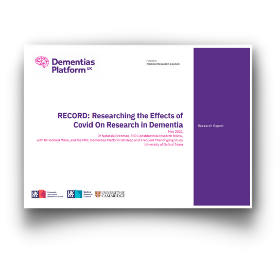 [1]A new report published today (24th June 2021) has found that clinical dementia research has been deprioritised during the COVID-19 pandemic [2]. In addition, the introduction of social distancing and shielding is amplifying the need to use new technologies to reach older people safely. The findings reveal key dilemmas and debates around how technology should be used to improve dementia research in future.
[1]A new report published today (24th June 2021) has found that clinical dementia research has been deprioritised during the COVID-19 pandemic [2]. In addition, the introduction of social distancing and shielding is amplifying the need to use new technologies to reach older people safely. The findings reveal key dilemmas and debates around how technology should be used to improve dementia research in future.
The findings of the report – titled ‘RECORD: Researching the Effects of COVID-19 on Research in Dementia’ – are derived from online focus group discussions with researchers involved in similar aspects of dementia research.
The report states that the long-term effects of COVID-19 have been recognised as an urgent priority for clinical research, which has overshadowed other chronic illnesses like dementia. This has led to many dementia research facilities being temporarily closed to facilitate COVID-19 research or vaccination programmes, making research assistant and coordinator roles both challenging and precarious.
The study also highlights reduced diversity among research participants. The report concludes that the pandemic is likely to have exacerbated the existing lack of representation in dementia research.
Given these challenges, it emerged that digital technologies have become increasingly necessary for assessing cognition and other signs of dementia remotely, to reach a broad range of people safely. However, concerns were raised about the clinical and scientific validity of these technologies: while some participants felt digital technologies were crucial to the future of dementia research, others felt they may be measuring the ‘wrong thing’ for early detection and prevention.
The research was carried out by researchers working on the Dementias Platform UK (DPUK) Deep and Frequent Phenotyping study [3] in Oxford. The report was led by Dr Natassia Brenman, who is completing an ESRC fellowship at Goldsmiths University and holds an honorary position at the University of Cambridge, where this investigation was based.
‘This research raises even more questions than it answers, highlighting the need to engage with the social and ethical uncertainties about the future of dementia research as well as the practical and scientific challenges. This should be done by listening closely to those navigating these issues day-to-day.’ Dr Brenman
For further information on DPUK and their work visit: https://www.dementiasplatform.uk/ [4]